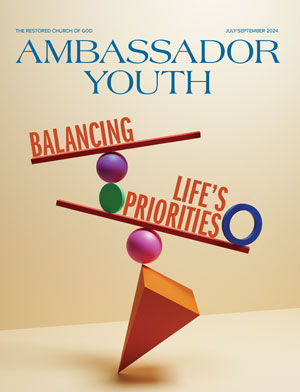“It is literally impossible to be a woman.” These words come from the hit movie “Barbie.” The sentence is the start of a monologue that outlines the many struggles women see for themselves today: “Like, we have to always be extraordinary, but somehow we’re always doing it wrong.”
“You have to never get old, never be rude, never show off, never be selfish, never fall down, never fail, never show fear, never get out of line. It’s too hard! It’s too contradictory and nobody gives you a medal or says thank you! And it turns out in fact that not only are you doing everything wrong, but also everything is your fault.”
The character concludes: “I’m just so tired of watching myself and every single other woman tie herself into knots so that people will like us.”
While the truth of these words is open to discussion, one thing is certain: The landscape of femininity today is both confusing and tough.
A song written for the movie hit on a similar theme, which is titled “What Was I Made For?” The lyrics center on a woman who does not know her purpose in life. The singer, who was 21 when she wrote it, ends the song longing for the day when she will know the answer to that question.
A movie discussing femininity clearly resonated with audiences around the world. “Barbie” made $1.45 billion worldwide. “What Was I Made For?” won the Oscar for Best Original Song.
Do not take this as a ringing endorsement to go watch that movie or listen to that song. However, both reveal that females today are really trying to figure things out.
The monologue from “Barbie” also highlights a distinctly feminine trait. Women often put a lot of pressure on themselves to fulfill what they perceive womanhood to be. They want to excel at their jobs, be perfect moms, be thin but also healthy and maintain a clean and orderly house—all while making it seem effortless.
For teenage girls, those pressures can be a desire for straight As, to fit in at school, to have flawless skin, to be first-chair in band, to be a star on the track and field team, or anywhere else where you want to be “the best.”
As with adults, such pressures leave many girls feeling anxious and overwhelmed. And it shows. Nearly a quarter of teen girls display symptoms of depression, according to the Anxiety and Depression Association of America. In addition, by mid-adolescence, girls are twice as likely to develop mood disorders as boys.
What about you? With all the expectations others put upon you—and that you place upon yourself—how do you manage it all? Where should you start?
God does not want any woman to feel overwhelmed or as if they are not measuring up. For this reason, He makes clear in the Bible what it means to be a woman.
Similar and Different
Often, discussions about men and women center around differences between the sexes. Yet this can cloud the issue. There is a lot more overlap than first meets the eye.
Genesis 1:27 is foundational here: “So God created man in His own image, in the image of God created He him; male and female created He them.”
God made everyone—whether male or female—in His image. His purpose is to reproduce Himself and have sons and daughters born into His divine Family.
Here is what He says will happen to those who follow His Way: “I will be a Father to you, and you shall be My sons and daughters, says the Lord Almighty” (II Cor. 6:18, New King James Version).
Galatians 3:28 emphasizes that among Christians: “There is neither Jew nor Greek, there is neither bond nor free, there is neither male nor female: for you are all one in Christ Jesus.”
Whether you are a boy or girl does not matter to God. He wants to build His character in you—all the things that make up who and what He is. This includes love, mercy, gentleness, boldness, strength and wisdom.
Despite some similarities between the sexes, there are still clear differences. God created “male and female,” two distinct genders. Given this, what are some distinctly feminine traits? Many would answer with things like being nurturing, sensitive, sweet, supportive, gentle, warm, passive, cooperative, expressive…
There is some truth in these stereotypes. Yet women are not a monolith—where every single lady is an exact copy of the other. Just as women physically come in all sorts of shapes and sizes, the same is true mentally and regarding their personalities.
Some of you are sportier and others more bookish. Some may enjoy being really “girly” and love wearing pink. Some of you may be more athletic and have more understated tastes. Any mix and match of such interests and likes and dislikes is fine. That is what makes you…you!
Along with this freedom of individuality, however, God does want women to emphasize certain characteristics He instilled in them at Creation.
Inner Strength, Outer Grace
In Proverbs 31, the Bible defines “the ideal woman.” Verse 10 states: “Who can find a virtuous woman? For her price is far above rubies.”
“Virtuous” can mean strong, efficient and able—and a woman with this character is worth far more than precious gemstones. The rest of the chapter details this type of woman in action.
Verse 11 says this: “The heart of her husband does safely trust in her, so that he shall have no need of spoil.” This woman is married, but that does not mean her example cannot apply to you as a teen. To get more from these verses, you should ask, “How did she get to this point?”
She cultivated her interests: Verse 13 says, “She seeks wool, and flax, and works willingly with her hands.” The virtuous woman found she had an interest in fashion and tailoring and worked hard to cultivate that skill. For you, seek out where your interests lie and do the same. It could be in writing, website design, nursing or 1,000 other things. Especially seek out skills you can use to help others.
She built confidence in her abilities: “She perceives that her merchandise is good” (vs. 18). Do not sell yourself short. If you have put a lot of time into an area of expertise, confidently share it with others. If you do not share your work, you are depriving others of your skills and all the lessons you can learn from constructive feedback. Yet a virtuous woman avoids bragging about herself (I Cor. 13:4), and instead lets “her own works praise her in the gates” (Prov. 31:31).
She learned to look out for others: Verse 20 says, “She stretches out her hand to the poor; yes, she reaches forth her hands to the needy.” Look for everywhere you can help others. It could be a classmate struggling to understand geometric proofs, a new co-worker who you can help feel more comfortable in their new role or aiding an elderly lady in cleaning her house.
She built physical and mental strength: Verse 17 states, “She girds her loins with strength, and strengthens her arms.” Do not shy away from being physically active. Consider doing some body-weight exercises or even a little weightlifting. Not only does physical strength help give you confidence—your clothes will fit better—it also gives you more energy so you can be more hardworking. Building physical toughness also requires building mental toughness.
Verse 30 helps summarize the Proverbs 31 woman and reveals potential pitfalls: “Charm is deceptive, and beauty does not last; but a woman who fears the Lord will be greatly praised” (New Living Translation). You should strive to help others and have a well-put-together appearance, but be careful of your motivations. Doing things simply for praise and to outshine others is a path that leads to emptiness and dissatisfaction. Instead, strive to lead a godly life. God will ensure you receive proper praise in time.
There are many more lessons you can learn from the Proverbs 31 woman. Read each verse and ask yourself what she did to get to the place she is. You can even include your mom or girl friends in the discussion.
Other Essential Qualities
Titus 2:4-5 encourages older Christian women to take younger ladies under their wings to help them.
This instruction, however, can go the other way too. Younger ladies, be sure you ask those who are older how to be a better woman. One question can be, “What do you wish you would have known when you were my age that no one told you?”
Verses 4-5 states that young women should “be sober, to love their husbands, to love their children, to be discreet, chaste, keepers at home, good, obedient to their own husbands, that the word of God be not blasphemed.”
Notice that much of this centers on roles in the home. This does not abrogate everything stated earlier regarding the industrious Proverbs 31 woman. Yet remember that God made humankind in His image to reproduce Himself. He also commanded everyone to “be fruitful and multiply” (Gen. 1:28). To put it delicately, “multiplying” requires marriage.
Being “sober” means to be moderate and sensible. Especially when young, it is easy to be tempted by extremes in dress and behavior. Asking the advice of older ladies can help you curb such impulses.
You do not yet have a husband or children, but look to be loving toward your family and the little children in your life. Love simply means outflowing concern for others. How can you better care for those around you?
Being “discreet” is similar to being sober. How can you be more self-controlled? This can be as simple as spending time working on a productive skill rather than binge-watching another TV show.
While you do not yet have your own house to be “keepers at home,” how does your bedroom look? Do you take care of your possessions? Are you doing your share of the housework along with your parents and siblings?
Do not get tripped up over the phrase “obedient to their own husbands.” While God tells women to submit to their spouses, look at what He requires from men: “Husbands, love your wives, even as Christ also loved the church, and gave Himself for it” (Eph. 5:25).
You can learn to submit in the relationships you have now. How obedient are to your parents, teachers and employers? How obedient are you to living God’s Way?
This passage also mentions the quality of being “good.” That word packs a lot of meaning. It means useful, pleasant, agreeable, joyful, excellent and honorable. Take a look at yourself. Where are you exhibiting these traits? Where can you improve?
This is just the briefest dive into Titus 2:4-5. Keep digging into these verses and look for ways to cultivate those characteristics in your life now. Use a Bible dictionary to learn the definition of each word and ask God to help you build those qualities.
Look Up to Others
It is worth repeating: Find the women in your life you can look up to. Especially seek out righteous ladies who have spent many years living God’s Way. They can be your fount of knowledge and help. Of course, lean on your mom. Although you may get frustrated with her sometimes, she understands what you are going through much more than you realize.
Godly examples of true femininity can be found in the Bible as well.
For example, Lydia was a successful entrepreneur who sold purple dye for clothing—a color that was chiefly worn by wealthy individuals. She was noted for being hospitable to the apostles and other Christians (Acts 16:14, 40).
In the Old Testament, Rebecca showed amazing kindness. While this young lady was drawing water at a well, a man just asked for a drink for himself. She quickly obliged and said she would also water his 10 camels (Gen. 24:16-20).
This story reveals Rebecca was both athletically fit and incredibly generous. A thirsty camel can drink up to 30 gallons in one sitting, which means she may have had to draw 300 gallons of water. Let’s assume she carried four gallons per trip, each of which would have weighed about 33 pounds. That would mean she made 75 trips!
Miriam, the sister of Moses and Aaron, was a songwriter (Ex. 15:20). Tabitha was noted for being “full of good works” (Acts 9:36) who made many coats and garments for the brethren (vs. 39). Junia was highly respected among the apostles (Rom. 16:7).
Dig into each of their stories and ask yourself how they got to the point of being singled out in Scripture. How can you be more like these impressive ladies?
Always remember you are not alone. Lean on the examples and counsel of others. Remember God is on your side as well.
When you step back and consider everything in this article, there is a lot involved with true femininity. The quote from earlier can seem to be true: “It is literally impossible to be a woman.” It is indeed challenging, but not impossible.
Start applying what you have learned. Right now, you can play a significant and positive role in your family, church congregation and community. The godly qualities found in Proverbs 31, Titus 2 and throughout the Bible will help you better understand femininity and grow into a strong, wise, compassionate woman.


















